Letters of Basil the Great (8 vols.)
Digital Logos Edition
Overview
Basil of Caesarea was an influential fourth-century theologian and Greek bishop who supported the Nicene Creed and fought against the heresies that threatened the early church. As one of the Cappadocian Fathers, he advanced early Christian thought and helped establish important doctrines. He was dedicated to monasticism—emphasizing communal living, serving the poor, and liturgical prayer. He also engaged with prominent Greek intellectuals and functioned powerfully in the political spheres of Asia Minor. For this and more he is revered as Saint Basil the Great.
The eight-volume Loeb Classical Library edition of Saint Basil’s Letters offers a sweeping perspective of this great theologian’s thought and work. The Letters are both historically significant and rich in personality, presenting the clearly passionate voice of Saint Basil and demonstrating his brilliant theological reasoning. He addresses all manner of people—governors, monks, family members, doctors, widows, bishops, and entire congregations. His words encourage, admonish, defend, and console. Basil discusses doctrine with influential bishops such as Eusebius, Meletius, and Athanasius but also writes “to the father of a student who has died” and to “a woman in sore distress.” Letters of Basil the Great offers the rare opportunity to delve into the life of a key Church Father through the full corpus of his correspondence.
This collection contains the complete texts in their Loeb Classical Library editions. Each text includes the original Greek and an English translation for easy side-by-side comparison. Logos’ language tools allow you to go deeper into the Greek text and explore Basil the Great’s elegant language. Students of Greek, history, patristic writing, and the classics will enjoy this work and appreciate its significance.
Key Features
- Over 350 of Saint Basil the Great’s personal and political letters
- Insights into the heart and mind of a great Church Father
- Loeb Classical Library Editions
Product Details
- Title: Letters of Basil the Great
- Author: Basil the Great
- Translator: Roy J. Deferrari
- Series: Loeb Classical Library
- Publisher: G. P. Putnam’s Sons and Harvard University Press
- Volumes: 8
- Pages: 1,948
This title is included in the following collections
You can save when you purchase this product as part of a collection.
Classic Life and Works of St. ...
$77.99$77.99Loeb Patristic Library Builder...
$199.99$199.99Logos 9 Orthodox Silver Legacy...
$349.99$349.99Loeb Classical Library Builder...
$1,269.18$508.99
- $849.99
- $849.99
- $849.99
- $1,499.99
- $1,499.99
- $1,499.99
- $2,999.99
- $2,999.99
- $2,999.99
- $3,413.99
- $4,749.99$3,562.49
- $4,749.99
- $12,102.39$7,299.99
- $7,749.99
- $11,377.57$8,499.99
- $12,989.68$10,391.74
- $23,999.99$17,999.99
- $21,749.99
- $24,999.99
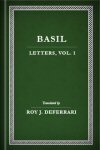
This volume contains an introduction to the influential life of Saint Basil, as well as Roy J. Deferrari’s translations of Letters I–LVIII.
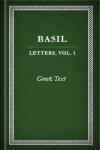
This volume contains the Greek texts of Letters I–LVIII.
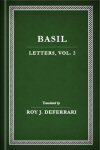
Letters, vol. 2
- Author: Basil the Great
- Translator: Roy J. Deferrari
- Series: Loeb Classical Library
- Publisher: G. P. Putnam’s Sons
- Publication Date: 1928
- Pages: 255
This volume contains Roy J. Deferrari’s translations of Letters LIX–CLXXXV.
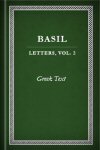
Letters, vol. 2: Greek Text
- Author: Basil the Great
- Series: Loeb Classical Library
- Publisher: G. P. Putnam’s Sons
- Publication Date: 1928
- Pages: 255
This volume contains the Greek texts of Letters LIX–CLXXXV.
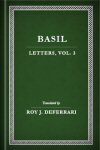
Letters, vol. 3
- Author: Basil the Great
- Translator: Roy J. Deferrari
- Series: Loeb Classical Library
- Publisher: Harvard University Press
- Publication Date: 1930
- Pages: 256
This volume contains Roy J. Deferrari’s translations of Letters CLXXXVI–CCXLVIII.
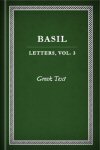
Letters, vol. 3: Greek Text
- Author: Basil the Great
- Series: Loeb Classical Library
- Publisher: Harvard University Press
- Publication Date: 1930
- Pages: 256
This volume contains the Greek texts of Letters CLXXXVI–CCXLVIII.
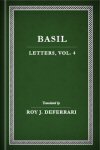
Letters, vol. 4
- Author: Basil the Great
- Translator: Roy J. Deferrari
- Series: Loeb Classical Library
- Publisher: Harvard University Press
- Publication Date: 1934
- Pages: 246
This volume contains Roy J. Deferrari’s translations of Letters CCXLIX–CCCLXVIII and Saint Basil’s “Address to Young Men on How They Might Derive Profit from Pagan Literature.”
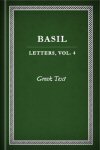
Letters, vol. 4: Greek Text
- Author: Basil the Great
- Series: Loeb Classical Library
- Publisher: Harvard University Press
- Publication Date: 1934
- Pages: 246
This volume contains the Greek texts of Letters CCXLIX–CCCLXVIII and Saint Basil’s “Address to Young Men on How They Might Derive Profit from Pagan Literature.”
About Basil the Great
St. Basil the Great (330–379) was bishop of Caesarea and an influential figure in the fourth-century Church. The Orthodox Church reveres him as one of the Three Holy Hierarchs (along with Ss. Gregory Nazianzus and John Chrysostom), and he is commemorated on January 1. He is best known for his monastic Rule as well as his monumental Treatise on the Holy Spirit. His homilies on the six days of creation and the Psalter are also treasured. Also attributed to him is the Divine Liturgy of Saint Basil the Great, used in the Orthodox Church throughout Great Lent as well as on other specific feast days.
Reviews
5 ratings
AeliusCicero
6/19/2014

Michael Mullen
3/29/2014
Michael Bremner
3/28/2014
Having the Greek text is very handy. The translation is easy to read as well.
Larry Proffitt (I
3/17/2014

Allen Bingham
3/7/2014